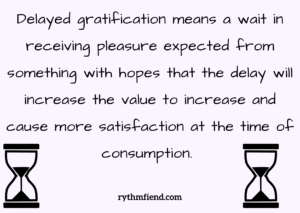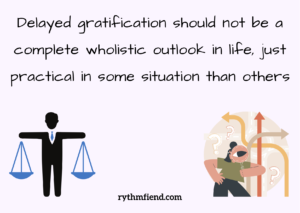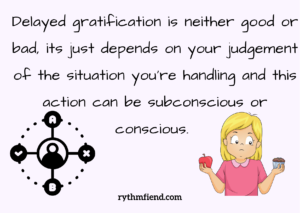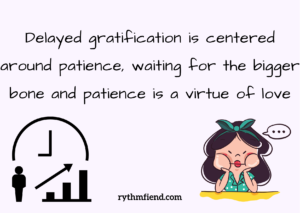- What is Delayed gratification?
- Is Delayed gratification good or bad?
- Is Delayed gratification worth it?
- Importance of Delayed gratification
What is Delayed gratification?

I won’t lie, my first encounter with the words “Delayed Gratification” was from the book “50 shades of Grey” by El James. I checked the dictionary for the meaning of gratification.
The word gratification simply means pleasure derived from a satisfied desire.
“Gratification” is defined by Cambridge as pleasure or satisfaction, or something which provides this.
Delayed gratification or deferred gratification, is the resistance to the temptation of immediate pleasure in the hope of obtaining a valuable and long-lasting reward in the long-term. (Wikipedia.com)
Delayed gratification simply means a wait in receiving pleasure from something. Hoping that the delay will cause the pleasure to marinade, increase in value and cause more satisfaction at the time of consumption.
Some people can practice this concept naturally due to their personalities, upbringing, etc. Contrarily, other people have to consciously practice and assume it as a learned behavior.
Looking back at my childhood, that must have been my biggest source of readiness to practice delayed gratification.
My parents almost rarely gave me anything other than my necessities: food, clothing, and education, shelter. The food wasn’t anything fancy or expensive, you have what everyone’s having and it was mostly sweet potatoes 😍.
My clothes weren’t anything flashy, just enough to cover you. Nothing stylish or expensive, very much thrifted. Our house was a house. Nothing like what I thought we deserved, but sufficient to be a good house. In fact, better than most houses in my community.
‘No’ was always the response to anything and everything. My dad instilled in me the spirit of looking forward to a brighter future. It may not here today, but it will be tomorrow.
Over time, that became my mantra, subconsciously and consciously. I found it easy to be patient with results and tame my expectations. If they don’t come now, they will come bigger and better in the future, right?
A social experiment on delayed gratification
A case of Delayed gratification was carried out on social media. Most likely during the pandemic of 2020.
Parents with toddlers tasked their children to not eat any treat from a bowl or pack of sweet treats. Not until they (the parents) return (which was a few minutes wait).
However, most children were unable to resist the temptation. They just ate as soon as their parents left the space. Although other children did wait, they were visibly struggling to be obedient to their parent’s instructions.
Some children were able to wait successfully. While others went for instant gratification.
It was a beautiful experiment that showed. Some could pull it off with a lot of effort. Evidently with hopes that their parents will reward them with more treats for being good. Contrarily, others just ate it because why not? It’s right in front of me.
Is Delayed gratification good or bad?

I’m a firm believer in Delayed gratification. Albeit, not as an overall outlook towards life, but practical in some situations.
Therefore, I can’t say Delayed gratification is bad or good.
It is a very subjective phenomenon, some situations require instant gratification and others may require Delayed gratification. The factors that determine which option is better are entirely up to the individual in question: their judgment of the situation they find themselves in.
Till the moment I wrote this article, my belief was in firm support of Delayed gratification as a general outlook in life. I thought my approach was waiting for things to grow.
Being the patient dog, not rushing for things. Basically allowing things to marinate to their highest saturation point. Obviously, I come in and sweep my beautiful reward from its place. Waiting patiently for me as I did for it, like a knight in shiny armor.
I had asked my boyfriend what he thought of Delayed gratification vs instant gratification. He said it depends on the situation. Markedly, this reply is probably the one that made me sit and think about what my perspective is.
He was right, you can’t practice Delayed gratification at all times. It does indeed depend on the circumstances surrounding the situation you’re in.
Looking further, I realized that my Delayed gratification approach mostly came into play in businesses and finances. I prefer to allow money to grow. I have interests in investment and money creation. Hence, my approach towards that is the patient dog who eats the fattest bones.
In other aspects of life, I might tend towards a generally reserved disposition. This is probably why I thought I applied Delayed gratification all the time.
Though this is often laced with a lot of moments of uncertainty, hastily made decisions, short-lived benefits, etc.
Most times I regretted being a patient dog, other times I regretted my decisions to be instantly gratified.
Even in my businesses and investment where waiting is my personal strategy. I equally experience very thin to inexistent bones. Just as much as I experience very fat bones. The fat bones just make up for thin and invisible bones.

In summary, there isn’t a yes or no answer to Delayed gratification. You can’t get it right always, either way.
I believe It depends on your cognition towards the situation you are handling. Subconsciously or not, you might lace your decision with a Delayed strategy or instant satisfaction.
Thus, it depends solely on You. Your present situation, your thought process, feelings, disposition, and hope.
Is Delayed gratification better?
If you do practice this, be aware of this knowledge. There is no assurance that the benefit of your wait will increase in value. There is no guarantee.
Think about it like gambling, on football for example. You might bet on a couple of matches. Say 10 matches. The bet brokers give you the option of cashing out your bet after a certain number of matches have gone correctly.
At the 7th correct match, you have the option to cash out. Although it is just a measly percentage of the full reward.
At this point, you can choose to enjoy instant gratification. I.e, you cash out at once and just enjoy the present value. It’s right in front of you, and you can choose to take it.
Otherwise, you could wait for a few more games. Or even wait for all 10 games to play out in your favor. You get a bigger cash-out, more significant than the first offer of cash-out. 100× more.
You could, chose either option: Delayed gratification or instant gratification. Cash out tiny now or cash out big later.
What makes delayed gratification worthwhile lies completely in the latter option.
The choice to wait till the end to enjoy an increase in value of satisfaction has a lot of “buts” and “what ifs”.
You might never actually get past this 7th game. It could be your last shot at luck and chance. You might make one more match but you might lose the remaining two matches.
How much can you afford to lose this option given to you now? What can this cash out do for you? Etc.
Knowing these, you can only say “Delayed gratification is worth it” after you’ve reaped the expected or more than expected benefit of waiting.
How can Delayed gratification be helpful?
This concept is important to developing life skills. These include patience, self-control, individual discipline, management of impulses, increased adaptive skills, etc.
“…patience is a virtue”- Stormi Webster

Delayed gratification centers around being patient, and waiting for a greater benefit. Patience is a quality of love. Love is very vital to self-care, love, and personal development.
Practicing this in situations deemed important in the journey of self-control, and development.
For instance, you’re diagnosed with a medical condition. Albeit, a way to manage your health amidst this health challenge is to change your meal consumption patterns. You have to cut out all unhealthy fat, and processed food. Eat only healthy foods.
Coincidentally, I am in this position right now. Honestly, as someone who has a lot of love for cakes and other confectionaries, it’s been a very trying journey. Instead, focusing on the goal, which is to be healthy and alive keeps me motivated. Patience is self-control. Self-control is self-love.
I love myself and I want the best for myself. Therefore, I shall be patient with myself and do only what’s best for my health. This process is made possible through the vision of the bigger picture: health, and sanity.
Long-term goals:
Being patient helps to achieve a long-term goal, a bigger reward. Like the case of the example above. My long-term goal is good health. No sugar, no health triggers, no anxiety, and no panic.
In other cases, like making an investment, or building a business, ‘holding on’ helps organizations and individuals to achieve long-term goals in projects.
Improves your impulse management skills:

Furthermore, this ideal will teach you how to manage your impulses. Self-control, patience, and discipline are very important cognitive skills to manage our impulses and daily lives.
It’s also an important skill that sharpens your psychological state. Especially when it comes to decision-making.
Also, it helps in adapting to new and challenging situations. Building relationships, making important decisions, managing finances, people, etc.
Choosing to be satisfied now or later all depends on you. What you think, know, and feel. Delayed gratification is a skill to be learned as it creates many benefits in individuals’ lives.
There are no downsides to self-control. It’s a goal to be able to manage your impulses and be patient. These are all qualities of loving ones self, building one’s self, and caring for you all around mental health.
Related: What is Emotional dependency?
